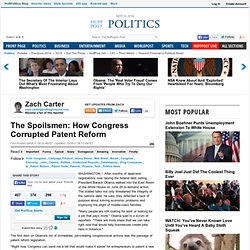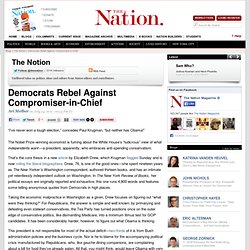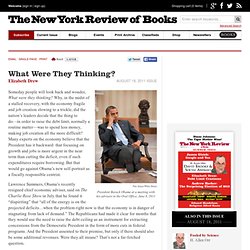

The Spoilsmen: How Congress Corrupted Patent Reform. WASHINGTON -- After months of dead-end negotiations over raising the federal debt ceiling, President Barack Obama walked into the East Room of the White House on June 29 to demand action.

The stalled talks not only threatened the integrity of the nation's debt, he said, they reflected a lack of purpose about solving economic problems and improving the plight of middle-class families. "Many people are still looking for work or looking for a job that pays more," Obama said to a scrum of reporters. "There are more steps that we can take right now that would help businesses create jobs here in America. " The first item on Obama's list of immediate, job-creating congressional actions was the passage of patent reform legislation. "Right now, Congress can send me a bill that would make it easier for entrepreneurs to patent a new product or idea, because we can't give innovators in other countries a big leg up when it comes to opening new businesses and creating new jobs," he said.
Audit the Tax Code: Doing What Works for Tax Expenditures. SOURCE: AP/Susan Walsh Spending programs delivered through tax expenditures should be subject to the same level of scrutiny as direct spending programs. We should make sure tax expenditures are efficiently delivering desired results. Tax expenditures that don’t work or are misguided should be scrapped—just the same as ineffective spending programs. By Sima J. Gandhi | April 13, 2010 Download the full report (pdf) Download the executive summary (pdf) Download to mobile devides and e-readers from Scribd Event: Government Spending Undercover See also: America’s Hidden Power Bill by Richard W.
Subsidyscope.org. Pew’s Subsidyscope Project, with assistance from its research and technology partner The Sunlight Foundation, completed its four-year effort to provide data and analysis to make federal government spending and subsidies more transparent in 2012.

Please visit the Fiscal Federalism Initiative project page and Federal Impact issue section of this website to learn more about Pew’s current work on federal fiscal issues. Subsidyscope presented data and analysis on federal spending and subsidies across nine broad economic sectors, including agriculture; education; energy; health; housing; national defense; natural resources and environment; science, space, and technology; and transportation. Subsidyscope made this information more accessible to policy makers and the public by aggregating information from multiple government data sources, creating searchable data sets, and providing sector-specific analyses.
Slothful MSM. Debt. The #Occupy MOVEMENT. Democrats Rebel Against Compromiser-in-Chief. Share “I’ve never won a tough election,” concedes Paul Krugman, “but neither has Obama!”

The Nobel Prize–winning economist is fuming about the White House’s “ludicrous” view of what independents want—a president, apparently, who embraces anti-spending conservatism. That’s the core thesis in a new article by Elizabeth Drew, which Krugman flagged Sunday and is now roiling the liberal blogosphere. Drew, 76, is one of the good ones—she spent nineteen years as The New Yorker’s Washington correspondent, authored thirteen books, and has an intimate yet relentlessly independent outlook on Washington. In The New York Review of Books, her political essays are originally reported and exhaustive; this one runs 4,800 words and features some telling anonymous quotes from Democrats in high places. Taking the economic malpractice in Washington as a given, Drew focuses on figuring out “what were they thinking?”
What Were They Thinking? by Elizabeth Drew. Someday people will look back and wonder, What were they thinking?

Why, in the midst of a stalled recovery, with the economy fragile and job creation slowing to a trickle, did the nation’s leaders decide that the thing to do—in order to raise the debt limit, normally a routine matter—was to spend less money, making job creation all the more difficult? Many experts on the economy believe that the President has it backward: that focusing on growth and jobs is more urgent in the near term than cutting the deficit, even if such expenditures require borrowing. But that would go against Obama’s new self-portrait as a fiscally responsible centrist. Lawrence Summers, Obama’s recently resigned chief economic adviser, said on The Charlie Rose Show in July that he found it “dispiriting” that “all of the energy is on the projected deficits…when the problem right now is that the economy is in danger of stagnating from lack of demand.”
It didn’t turn out that way. Justice in America.